Edition: 23 September to 4 October 2024
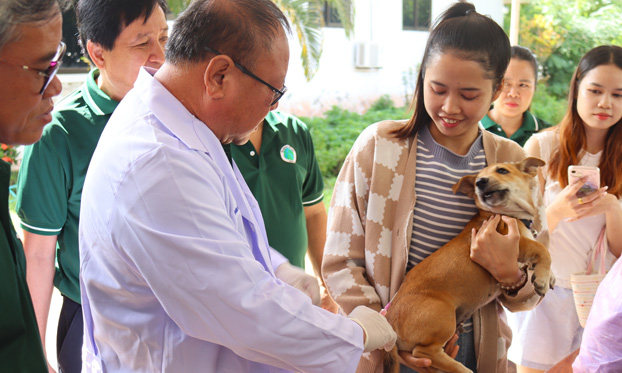 © FAO/Bounmee Maokhamphiou | LAO PEOPLE'S DEMOCRATIC Government agencies and development partners join forces to address rabies FAO, in collaboration with WHO and WOAH, helped the Ministry of Health and Ministry of Agriculture and Forestry in organizing the World Rabies Day 2024 event at Sayaboury Provincial Agriculture and Forestry Office on 27 September. The event was funded by USAID. FAO has been assisting member countries in the design and implementation of rabies vaccination and control programmes; in developing and distributing educational materials, promoting World Rabies Day and fostering operational research. To mark the event this year, FAO provided the Department of Livestock and Fisheries with 4,000 doses of rabies vaccines and vaccination equipment. Read more here. |
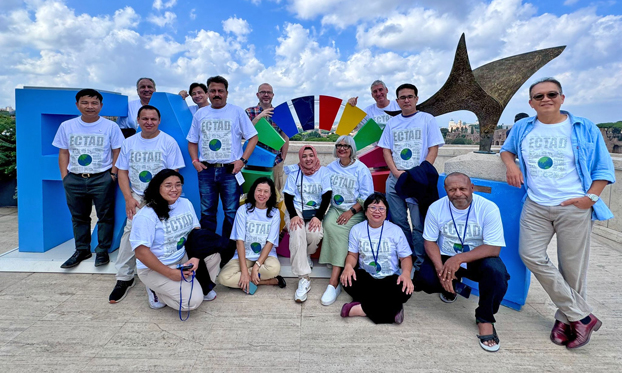 © fao | ASIA AND THE PACIFIC First FAO global conference on animal health innovation FAO ECTAD joined the first FAO Global Conference on Animal Health Innovation, Reference Centres and Vaccines from 23 to 25 September. In addition to RAP, country teams from Bangladesh, Cambodia, Fiji, India, Indonesia, Lao People’s Democratic Republic, Myanmar, Nepal, Papua New Guinea, Philippines and Viet Nam were also represented in the conference. The teams also participated in various technical side-events, including a consultation with the FAO ADG and CVO, Dr Thanawat Tiensin, together with other regional officers from around the world. |
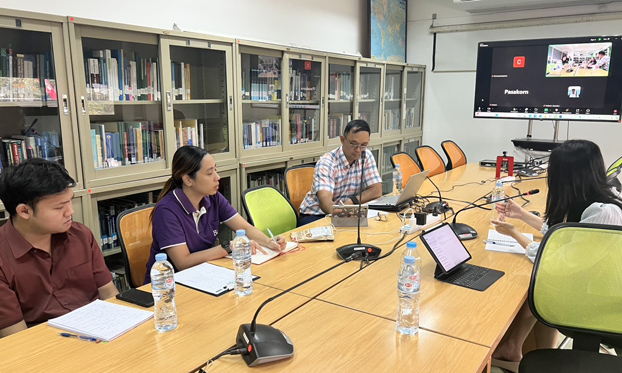 © FAO/Asfri Rangkuti | ASIA AND THE PACIFIC Discussing collaboration between FAO and FETN On 2 October, FAO and the ASEAN+3 Field Epidemiology Training Network (FETN) convened to explore opportunities for collaboration following their productive meeting at the FAO office in September 2024. The discussions focused on revitalizing partnerships between the region's human and animal health epidemiology networks. Key initiatives include One Health training sessions and simulation exercises. Both parties expressed their commitment to holding regular coordination meetings to ensure ongoing collaboration and to strategize for future joint initiatives. |
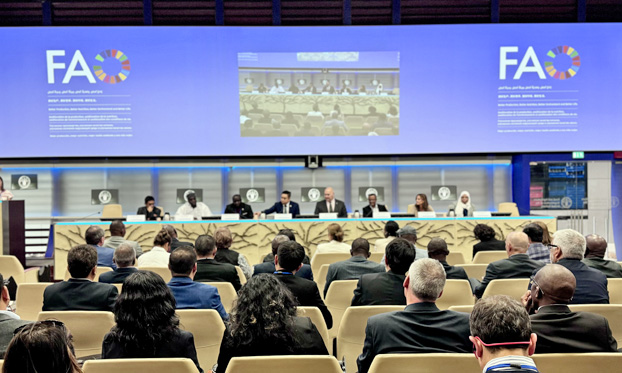 © fao/Mary Gordoncillo | ASIA AND THE PACIFIC Celebrating FAO ECTAD's 20th anniversary Commemorating the establishment of the ECTAD programme, FAO organized a celebratory event showcasing the work that FAO has done in the region, alongside work that has been done around the world. From the Asia-Pacific, Dr Imron Suandy, the Director of the Department of Animal Health of Indonesia, shared inputs and insights on their own experience regarding their collaboration with FAO ECTAD Indonesia. FAO ECTAD Asia-Pacific participated in the celebration in full force. |
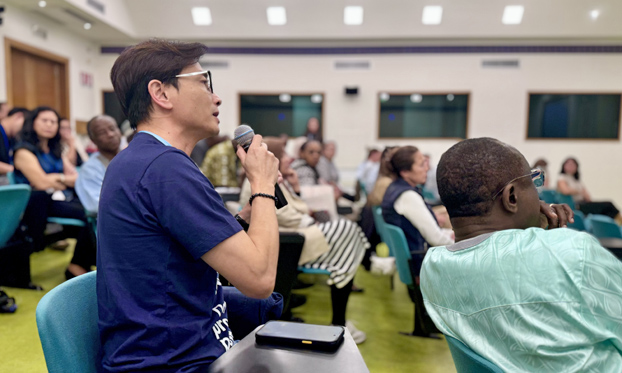 © fao/Mary Gordoncillo | ASIA AND THE PACIFIC AND CAMBODIA First ECTAD global coordination meeting |
Learn more about our work on partnerships here. | |
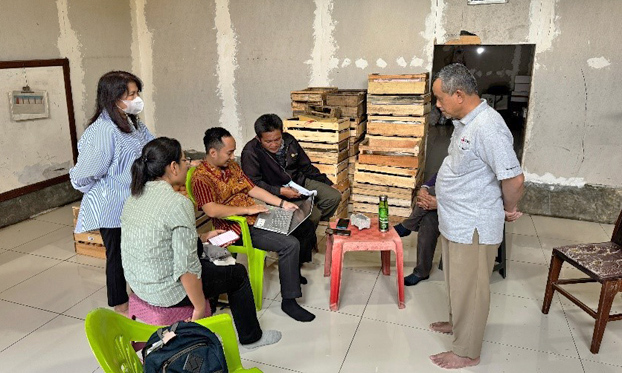 © fao/Erianto Nugroho | INDONESIA Training on commercial poultry farming information system in West Java Province FAO and the Indonesian Ministry of Agriculture, with support from USAID, conducted training on the new version of Si Petung 2.0 from 18 to 21 September in Sukabumi district and West Bandung District, West Java Province. The application is designed to collect data on commercial poultry circulation across various regions, providing valuable insights into supply and demand for population management. The training session brought together government officials from provincial and district levels, along with representatives from the private poultry sector, including associations and companies. Participants were trained on the effective use of the Si Petung 2.0 application to enhance data tracking and analysis.
|
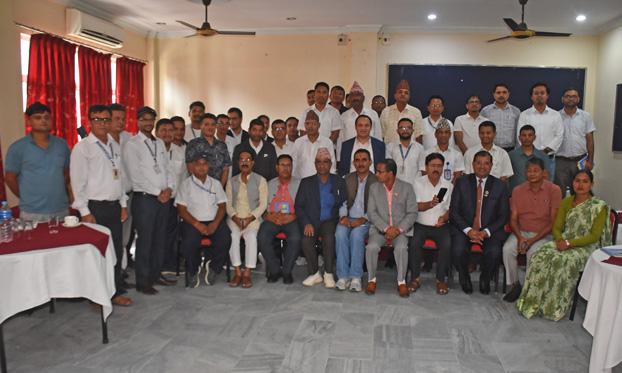 © Vet Lab Dhangadhi/Tirtha Raj Pokhrel | NEPAL Stakeholder consultation at the local level on rabies prevention and control FAO provided technical assistance to the Department of Livestock Services (DLS) to organize a multi-sectoral stakeholder consultation on rabies prevention and control in Sudurpaschim province. The meeting, organized in close collaboration with Veterinary laboratory, Dhangadhi, was conducted on 18 September where thirty-seven participants from various sectors took part. The objective of this meeting was to highlight the current situation of rabies in the province to high-level government officials.
|
Learn more about our work on capacity development here.
| |
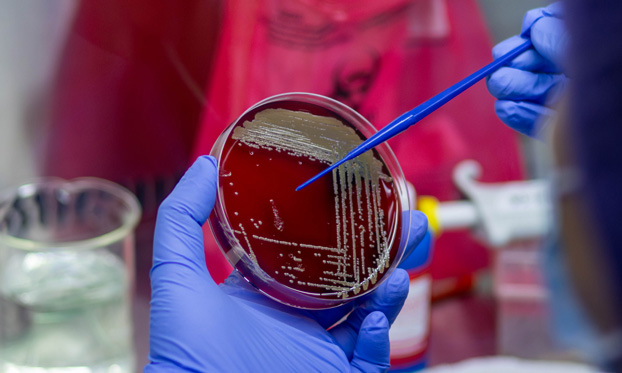 © BAI/Mervyn Agad | THE PHILIPPINES Building laboratory capacity for AMR surveillance in Cagayan de Oro City
FAO, in continued partnership with the Philippine Bureau of Animal Industry (BAI) and with support from the USAID Global Health Security Project and Fleming Fund UK, conducted the “Refresher Training and Parallel Testing on Bacterial Isolation, Identification, and Antimicrobial Susceptibility Test (AST)” for the Regional Animal Disease Diagnostic Laboratory (RADDL) X in Cagayan de Oro City, from 27 September to 4 October. This is the 14th of 15 regional laboratory visits, during which FAO introduced the Assessment Tool for Laboratories and AMR Surveillance Systems (ATLASS) for assessment of laboratories, marking this the first sub-national laboratory to be assessed using this tool. Thanks to the continuing support of Fleming Fund UK and USAID, FAO and BAI regularly conduct this training to enhance laboratory capacity, implement the National AMR Surveillance of Diseased Livestock, harmonize laboratory procedures, and standardize laboratory practices. |
Learn more about our work on capacity development of laboratory here.
| |
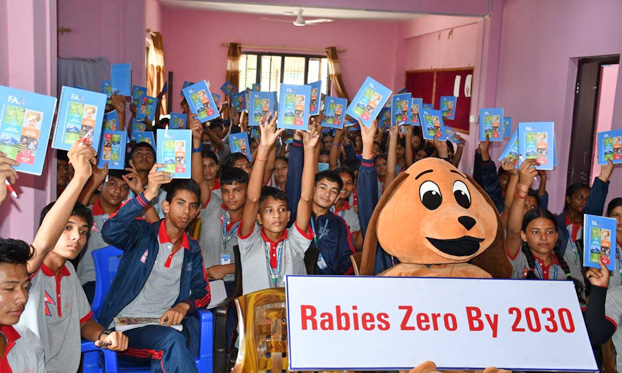 © Vet Lab Dhandaghi/Naresh Prasad Joshi | NEPAL School awareness campaign on rabies
FAO, through the USAID-funded GHS project supported DLS to conduct a nationwide campaign on rabies awareness for school students. The campaign launched in different parts of Nepal during the month of September where more than 40 000 students from 600 schools across all seven provinces of Nepal were reached. These awareness campaigns are expected to contribute to the behavior change of participants thereby leading to an increase in dog vaccination and seeking medical care and vaccination in post-animal-bite cases ultimately contributing to the “Zero by 30” target of Rabies elimination. The event was organized in close collaboration with Nepal Veterinary Association, Veterinary Practitioners Association Nepal and Veterinary Laboratory, Dhangadhi. |
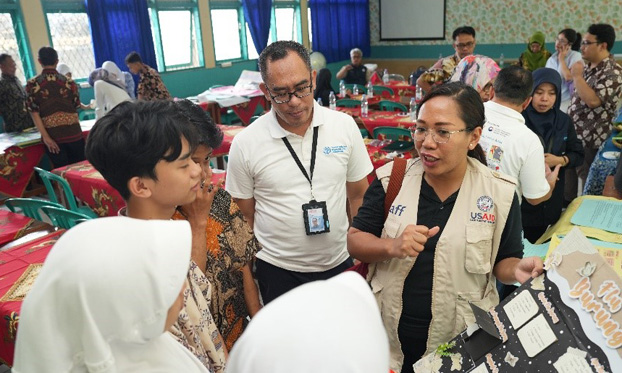 © FAO/Eko Prianto | INDONESIA School visits to monitor the zoonoses awareness programme
From 26 to 27 September and 2 to 3 October, FAO and the Directorate of Veterinary Public Health at the Ministry of Agriculture conducted visits to selected schools in West Bandung District and Sukabumi Regency to monitor the implementation of the independent learning curriculum focused on zoonoses awareness. These schools, participating in the zoonoses awareness program in collaboration with West Java BBGP and supported by USAID, have integrated zoonoses education through three key approaches: intracurricular subjects, co-curricular activities via the Pancasila Student Profile Strengthening Project (P5), and extracurricular projects. The inclusion of zoonoses awareness in P5 promotes student creativity, allowing each school to tailor the themes to their educational objectives. |
Learn more about our work on risk reduction along the value chain here.
| |
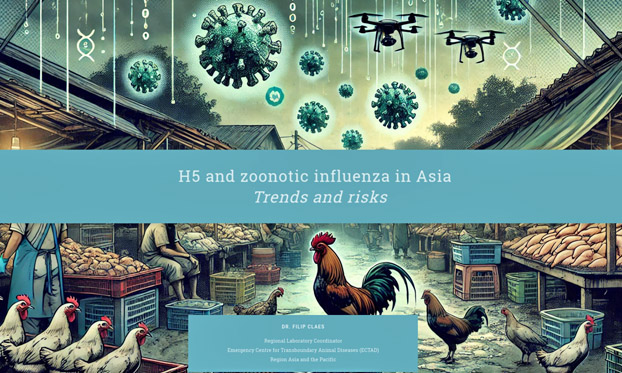 © FAO/Filip Claes | ASIA AND THE PACIFIC USAID emerging threats division science and development forum FAO presented at the USAID Emerging Threats Division Science and Development Forum held on 26 September. During the virtual panel, Filip Claes, Regional Laboratory Coordinator for ECTAD RAP, presented on "H5 and Zoonotic Influenza in Asia: Current Trends and Risks," sharing insights into the evolving landscape of zoonotic influenza in Asia. Filip's presentation highlighted emerging trends, potential challenges, and gaps in understanding of influenza. He emphasized the importance of exploring new ways forward such as air sampling, next gen sequencing, and metagenomics for influenza surveillance, ultimately aiming to enhance preparedness and mitigate risks associated with zoonotic influenza.
|
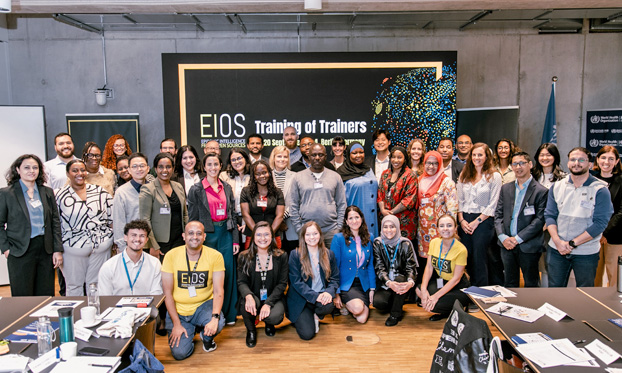 © FAO/Moon Mugyeom | ASIA AND THE PACIFIC Participating in the epidemic intelligence from open sources workshop FAO participated in the 2024 Epidemic Intelligence from Open Sources (EIOS) Training of Trainers workshop at the WHO Pandemic Hub in Berlin from 16 to 20 September. Over 30 participants from various countries gathered to enhance their capacity to deliver training on the EIOS system and public health intelligence, which is essential for improving disease threat detection and decision-making at both the national and global levels. During the workshop, FAO shared its experiences from the animal health sector for early warning purposes and highlighted the importance of collaborative surveillance for public health intelligence as a One Health approach.
|
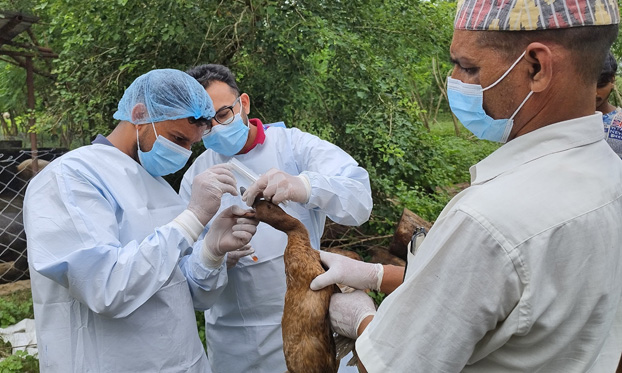 © Vet Lab Dhangadhi/Naresh Prasad Joshi | NEPAL Bio-surveillance of avian influenza FAO, through the USAID-funded Global Health Security and Pandemic Fund “SPEED” projects, supported the Central veterinary laboratoryto conduct bio-surveillance of avian influenza in sixteen high risk districts of Nepal. The objective of this bio-surveillance programme is to track the circulation of avian influenza virus in poultry and pig population in the studied districts. Samples were collected in close collaboration with sub-national veterinary diagnostic laboratories, Veterinary Hospital and Livestock Services Expert Centers (VHLSECs) and respective municipalities.
|
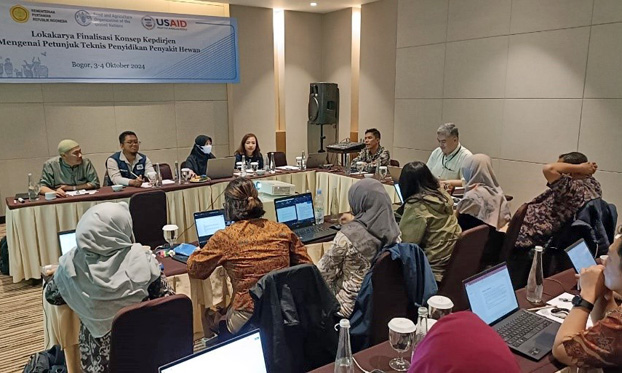 © FAO/Riana Arief | INDONESIA Finalizing Ministry of Agriculture's decree on technical guidelines for animal disease investigation With support from USAID, FAO partnered with the Indonesian Ministry of Agriculture to hold a workshop to finalize the technical guidelines for animal disease investigation in Bogor from 3 to 4 October 2024. The legal unit of Director General of Livestock and Animal Health Services MoA reviewed the document and provided valuable feedback to improve its conciseness and alignment with existing MoA regulations. Following the workshop, the technical guidelines will be legalized through a decree from the Director General of Livestock and Animal Health Services and become the official guidance for national and local governments in conducting investigations of animal disease events.
|
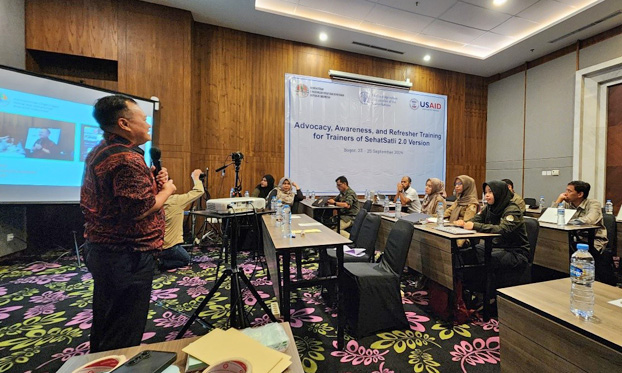 © FAO/Andri Jatikusumah | ASIA AND THE PACIFIC Refresher Training for Trainers of SehatSatli 2.0 Version FAO, in collaboration with the Directorate of Species and Genetic Biodiversity Conservation (KKHSG) at the Ministry of Environment and Forestry, and with support from USAID, organized an advocacy meeting and refresher training for trainers on SehatSatli 2.0 from 23 to 25 September 2024. The event aimed to enhance the capacity and expand the coverage of SehatSatli as a wildlife health surveillance tool, both in situ and ex situ. SehatSatli has been integrated with the human health surveillance system (SKDR) and the animal health system (iSIKHNAS), and is interoperable with the National SIZE system. The training provided participants from Natural Resources Conservation Agency (BKSDA) offices, National Parks, and conservation institutions across Indonesia with updated knowledge on the tool’s new features and functionalities.
|
| Learn more about our work on surveillance here. | |
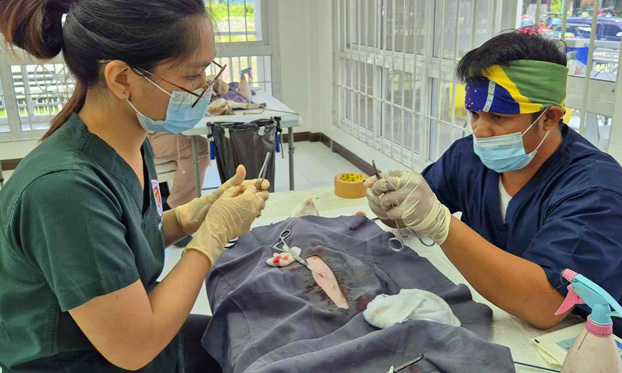 © FAO/Aleli Marasigan | THE PHILIPPINES Joining forces towards rabies elimination in Oriental Mindoro With support from the USAID Global Health Security Project, FAO participated in the year's final leg of the MIMAROPA Region One-Time Big-Time (OTBT) Rabies Initiative in the province of Oriental Mindoro held from 23 to 28 September. Volunteers from local governments, non-governmental organizations, private companies, and development partners successfully vaccinated over 5 500 pets against rabies, and spayed and neutered more than 750 pets in the municipalities of Roxas and Puerto Galera, and Calapan City. This annual region-wide activity led by local animal health authorities is essential in sustaining momentum towards rabies elimination in the Philippines. Moreover, expanding similar strategies and best practices across other regions is critical to achieving the global goal of Zero by 2030.
|
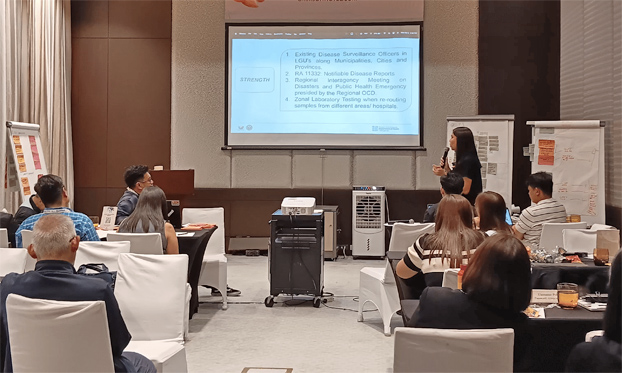 © FAO/Michelle Balbin | THE PHILIPPINES Adopting and strengthening One Health at the local level FAO, along with experts from the Global health technical assistance and missions support (GH-TAMS) and the Field epidemiology training program alumni foundation, Inc. (FETPAFI), facilitated the One Health strategy workshop from 1 to 3 October which was organized by the Department of Health (DOH) Center for Health Development (CHD) Region IV-A Regional Laboratory Network. The workshop mapped the region’s existing coordination platforms as well as gaps and possible interventions to address and strengthen One Health coordination. FAO discussed the Quadripartite Tools and shared the importance of conducting joint risk assessments for understanding and providing management and control strategies for various diseases and public health threats. FAO's participation in this event was made possible through the support of the USAID Global Health Security Project. |
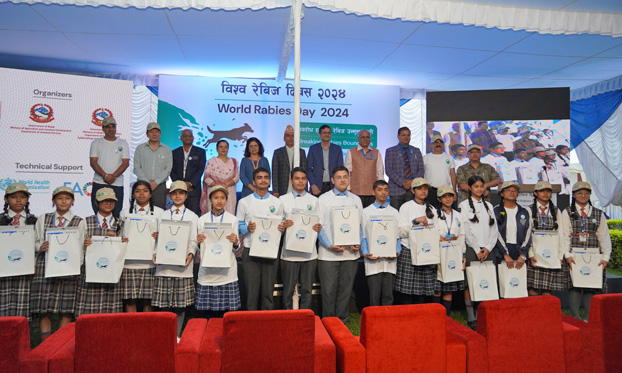 © FAO/Suman Giri | NEPAL Commemoration of World Rabies Day 2024 FAO, through USAID-funded Global Health Security project conducted two events focusing on One Health stakeholders and veterinarians to commemorate World Rabies Day 2024 in Lalitpur and Kathmandu respectively. A joint event was conducted on 27 September in Lalitpur bringing together 180 participants from various sectors to enhance multi-sectoral coordination and collaboration between human and animal health sectors to achieve the target of “Zero by 30”. Additionally, an interactive workshop on rabies was conducted on 28 September to increase awareness on rabies prevention and control among animal health professionals. These events were organized in collaboration with DLS, Epidemiology and Disease Control Division (EDCD), NVA and WHO Nepal.
|
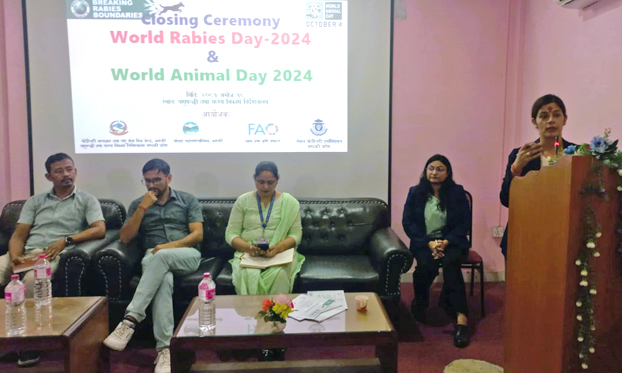 © Vet Lab Pokhara/Ganesh KC | NEPAL Commemoration of World Rabies Day in Gandaki province FAO, through the USAID-funded Global Health Security project provided technical assistance to the Directorate of Livestock and Fisheries Development, Gandaki to conduct a series of events to commemorate World Rabies Day 2024. Three activities including awareness-raising on rabies to school students, community dog population management, and mass dog vaccination programmes were conducted with the reach of more than 5 000 students in school awareness programme, 261 dogs being sterilized and more than 3 800 community dogs being vaccinated against rabies. The objective of these collective activities was to contribute towards “Zero by 30” target of rabies elimination. The events were conducted in close collaboration with Veterinary Hospital and Livestock Service Expert Center (VHLSEC), Pokhara.
|
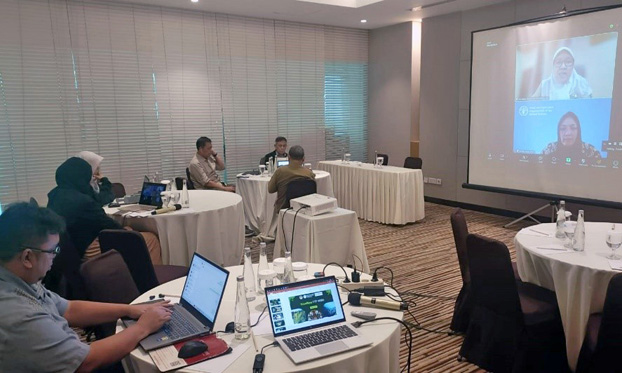 © FAO/Riana Arief | INDONESIA Finalizing the FTP-WEBE curriculum FAO and the Indonesian Ministry of Environment and Forestry (MoEF) collaborated to finalize the curriculum and materials for the Field Training Program for Wildlife, Environment, Biodiversity, and Ecosystems (FTP-WEBE) in Indonesia which will be launched in 2025. The workshop, held from 30 September to 2 October in Bogor, resulted in the identification of trainers, mentors, and participants for the first cohort of FTP-WEBE. The first cohort of FTP-WEBE participants will be selected from resort units and comprised of forest rangers, forest ecosystem controllers, extension officers, and veterinarians. The programme is supported by USAID.
|
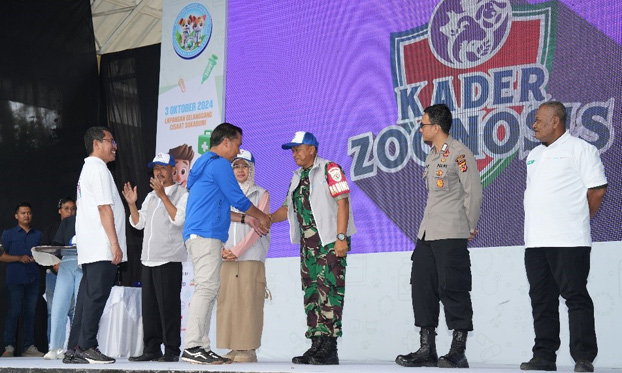 © FAO/Eko Prianto | INDONESIA Breaking boundaries for a rabies-free Indonesia on World Rabies Day 2024 FAO, in collaboration with the West Java Provincial Government, Sukabumi Regency Government, and the Directorate General of Livestock and Animal Health (DGLAHS MoA), and supported by USAID, celebrated World Rabies Day 2024 in Sukabumi Regency. The theme, "Breaking Rabies Boundaries," underscores Indonesia’s commitment to the One Health approach, promoting multisectoral collaboration to overcome obstacles in rabies elimination. The event featured activities to raise awareness and strengthen rabies prevention, including student competitions, training for field officers, the distribution of an integrated zoonoses information app, the launch of community zoonoses cadres, and the unveiling of JAWARA, a roadmap to eliminate rabies on Java Island by 2029.
|
| Learn more about our work on One Health here. | |
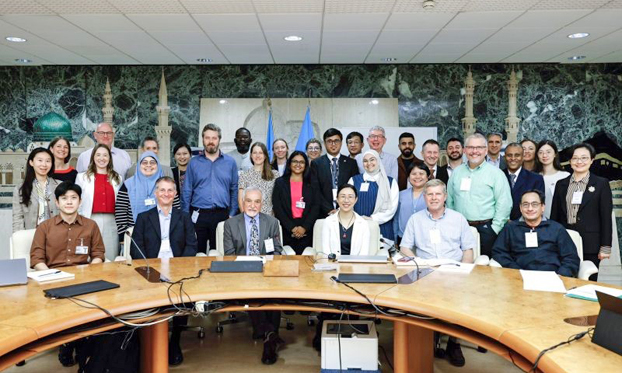 © FAO | ASIA AND THE PACIFIC Second annual congress network of FAO reference centre for AMR
FAO participated in the annual congress from 19 to 20 September. Building on the first congress in 2023, this second congress was organized to discuss updates and plan the ways forward for this collaboration. Recognizing the value of this platform for the region given its long-standing work with the Chulalongkorn University (globally designated as FAO Reference Centre for AMR in Thailand) and other FAO Reference Centres for AMR, Dr Mary Joy Gordoncillo, Dr David Sutherland and Dr Usman Zaheer participated as part of the AMR team representing FAO RAP. |
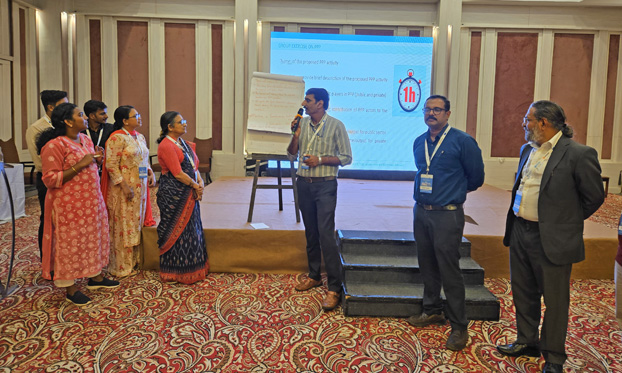 © FAO/Bushra Owaisy | INDIA Private sector engagement workshop to address AMR in the fisheries sector
FAO India and FAO RAP, in collaboration with the Food Safety and Standards Authority of India (FSSAI), the Marine Products Export Development Authority (MPEDA), and the National Food Laboratory (NFL) Chennai, organized the final session in a three-part series titled "Working Together to Fight Antimicrobial Resistance in Asia and the Pacific” on 25 September." The workshop, organized under the European Union (EU) Tripartite AMR Project, aimed to enhance private sector engagement in addressing antimicrobial resistance (AMR) in the fisheries sector. The workshop attended by over 55 participants, focused on assessing the economic impact of AMR and the regulatory measures in place to address it in India. |
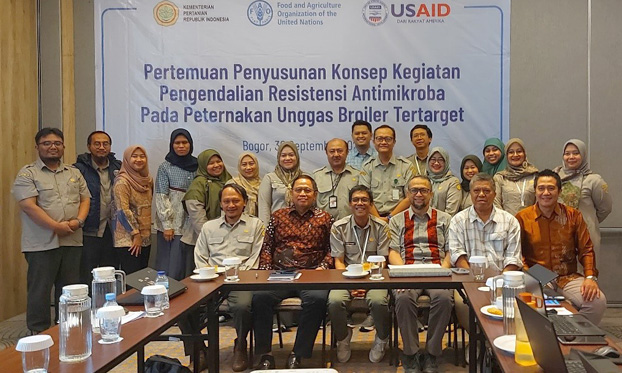 © FAO/Gunawan Utomo | INDONESIA Discussing the AMR control indicators in the animal health sector with government and poultry industry stakeholders
On 30 September, FAO, in collaboration with the Indonesian Ministry of Agriculture and with support from USAID, held a meeting in Bogor to discuss strategies for measuring AMR Control Indicators in the Animal Health Sector, specifically for the National Medium-Term Development Planning (RPJMN). The meeting aimed to establish a robust data collection framework for AMR control indicators in broiler poultry farms, fostering partnerships between the government and the private sector. Agreements were reached on specific activities and target indicators for inclusion in the upcoming National Action Plan (NAP) on AMR, with a particular focus on the first indicator: the percentage of commercial poultry farms implementing responsible antibiotic use. |
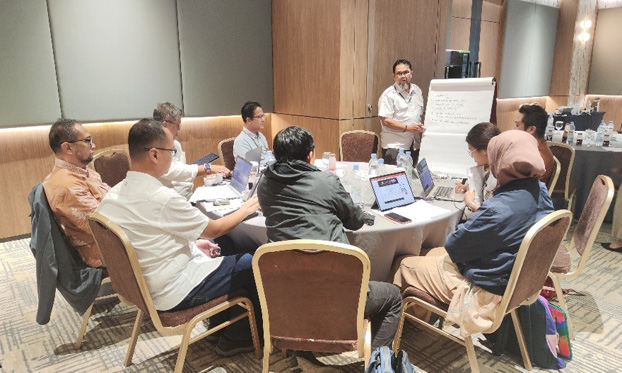 © FAO/Erianto Nugroho | INDONESIA Meeting on the NAP AMR 2025-2029 Theory of Change
Supported by the European Union (EU), FAO and the Coordinating Ministry of Human Development and Cultural Affairs (CMHDCA) convened a meeting from 3 to 4 October in Bogor to discuss the Theory of Change for the 2025-2029 National Action Plan (NAP) on Antimicrobial Resistance (AMR). Prior to this, CMHDCA and the AMR control task force (POKJA) reviewed the 2020-2024 NAP, identifying key strengths and weaknesses, and offering recommendations for the development of the next NAP. The meeting resulted in a draft of the 2025-2029 NAP’s objectives, outcomes, strategies, and indicators, which will be further refined through upcoming intensive drafting sessions based on the evaluation of the previous plan. |
Learn more about our work on AMR here.
| |
